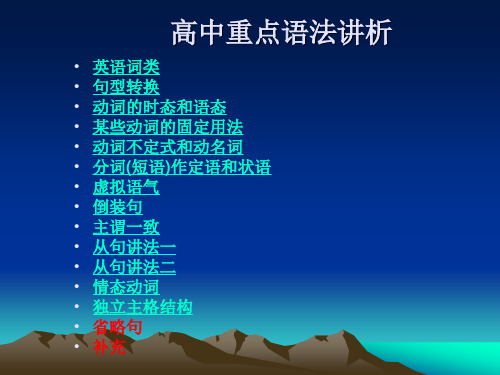高中英语分词语法(46张ppt)
合集下载
高中英语 语法 现在分词作状语(共31张PPT)

他句子成份。
需要注意的事项
1. V-ing 形式
V-ing 形式由 “do+ing” 构成, V-ing 可以带宾语或状 语构成 V-ing 短语, 没有人称和数的变化, 但有时态 和语态的变化。
否定形式: not doing 语态:主动或被动 时态:当分词的动作完成以后,主句的动作才发生时,
用现在分词的完成形式作状语。
The person _t_r_a_n_s_la_t_in_g_t_h_e_s_o_n_g_s_can speak seven languages.
3. The boy standing there is reading a book about body language.
The boy _w_h_o_ _is_ _s_t_a_n_d_in_g_ there is reading a book about body language. 4. Because he comes from Jordan, he moves close to ask you a question.
is my father. 定语
When meeting guests, he often felt uneasy.
表时间
Not knowing her telephone number, I didn’t
phone her.
表原因
Turning to the left, you’ll see a school.
When leaving the station, he waved again and again to me.
3. 现在分词作状语时,有时可以在分词前加 once, although, though, until, if 等连词。
需要注意的事项
1. V-ing 形式
V-ing 形式由 “do+ing” 构成, V-ing 可以带宾语或状 语构成 V-ing 短语, 没有人称和数的变化, 但有时态 和语态的变化。
否定形式: not doing 语态:主动或被动 时态:当分词的动作完成以后,主句的动作才发生时,
用现在分词的完成形式作状语。
The person _t_r_a_n_s_la_t_in_g_t_h_e_s_o_n_g_s_can speak seven languages.
3. The boy standing there is reading a book about body language.
The boy _w_h_o_ _is_ _s_t_a_n_d_in_g_ there is reading a book about body language. 4. Because he comes from Jordan, he moves close to ask you a question.
is my father. 定语
When meeting guests, he often felt uneasy.
表时间
Not knowing her telephone number, I didn’t
phone her.
表原因
Turning to the left, you’ll see a school.
When leaving the station, he waved again and again to me.
3. 现在分词作状语时,有时可以在分词前加 once, although, though, until, if 等连词。
高考英语语法复习-分词 PPT课件 图文

They lived in a room facing (= that faced) the south.
The house standing (= that stands) at the corner of the street was built in 1955.
④ 过去分词作定语时,过去分词所表示的 动作可以在谓语所表示的动作之前发生, 也可以是没有一定的时间性,如:
注意
注①:如果所表示的动作现刻正在 发生,或是与谓语所表示的动作同 时发生,可以用现在分词的被动形 式来表示
The meeting being held is very important.
We must keep a secret of the things being discussed here.
意与被动结构的区别。
系表结构说明主语的状态或具有的性质、 特点; 被动结构强调谓语动作,指主语所承受 的动作。
The small village is surrounded by trees. (状态)
The small village was soon surrounded by enemy soldiers. (动作)
系表结构:a. 常用一般现在或一般过去时 态;b. 一般不带状语;c. 可以有不及物动 词的过去分词。 被动结构:a. 有多种时态,常与主动语态 的时态一致;b. 可以带时间、方式或 by 短 语作状语;c. 必须是及物动词。
I’m interested in chess.
I was interested by what you told me.
如:
Be careful when crossing the street.
Don’t mention this while talking to him.
The house standing (= that stands) at the corner of the street was built in 1955.
④ 过去分词作定语时,过去分词所表示的 动作可以在谓语所表示的动作之前发生, 也可以是没有一定的时间性,如:
注意
注①:如果所表示的动作现刻正在 发生,或是与谓语所表示的动作同 时发生,可以用现在分词的被动形 式来表示
The meeting being held is very important.
We must keep a secret of the things being discussed here.
意与被动结构的区别。
系表结构说明主语的状态或具有的性质、 特点; 被动结构强调谓语动作,指主语所承受 的动作。
The small village is surrounded by trees. (状态)
The small village was soon surrounded by enemy soldiers. (动作)
系表结构:a. 常用一般现在或一般过去时 态;b. 一般不带状语;c. 可以有不及物动 词的过去分词。 被动结构:a. 有多种时态,常与主动语态 的时态一致;b. 可以带时间、方式或 by 短 语作状语;c. 必须是及物动词。
I’m interested in chess.
I was interested by what you told me.
如:
Be careful when crossing the street.
Don’t mention this while talking to him.
高中英语语法过去分词的用法(30张)ppt课件

to be produced B. produced C. being produced D. having produced
;
区别
①过去分词做定语:表被动,表完成。 ②如今分词作定语:表自动,表进展。 ③不定式作定语:表示将要发生的动作。
;
2. 过去分词作表语
位于系动词后,不表示“被动〞或“完成〞, 而表示主语的形状或心情,相当于描画词。
(encourage).
• We were __e_n__c_o_u_r_a_g_e_d__ (encourage )at
what he said.
• The football game is very _b_o_r_i_n_g__(bore). • We were _b_o_r_e_d__(bore) at the football
“觉得类〞: feel, sound, smell, taste “变成类〞:become, go, get, grow, fall, turn “依然类〞:remain, stay, keep
;
V-ing 与V-ed 作表语的区别
• What he said was e_n__c_o_u_r_a_g_i_ng
south foot of the mountain is a sea of
trees.
〔陕西2021〕
A. Seen
B. Seeing
C. Having seen
D. To see
;
2. ______ twice, the postman refused to
deliver our letters unless we chained
the time. 4. 2.带有“致使〞含义的动词: have, make 5. 〔1〕留意〞have sth done〞的两种用法: 6. ①表示让某人做某事,如: 7. I have had my bike repaired . 8. The villagers had man;y trees planted just then.
;
区别
①过去分词做定语:表被动,表完成。 ②如今分词作定语:表自动,表进展。 ③不定式作定语:表示将要发生的动作。
;
2. 过去分词作表语
位于系动词后,不表示“被动〞或“完成〞, 而表示主语的形状或心情,相当于描画词。
(encourage).
• We were __e_n__c_o_u_r_a_g_e_d__ (encourage )at
what he said.
• The football game is very _b_o_r_i_n_g__(bore). • We were _b_o_r_e_d__(bore) at the football
“觉得类〞: feel, sound, smell, taste “变成类〞:become, go, get, grow, fall, turn “依然类〞:remain, stay, keep
;
V-ing 与V-ed 作表语的区别
• What he said was e_n__c_o_u_r_a_g_i_ng
south foot of the mountain is a sea of
trees.
〔陕西2021〕
A. Seen
B. Seeing
C. Having seen
D. To see
;
2. ______ twice, the postman refused to
deliver our letters unless we chained
the time. 4. 2.带有“致使〞含义的动词: have, make 5. 〔1〕留意〞have sth done〞的两种用法: 6. ①表示让某人做某事,如: 7. I have had my bike repaired . 8. The villagers had man;y trees planted just then.
高中英语语法汇总课件(共184张PPT)

Eg. Either my father or my brothers are coming. Either my brothers or my father is coming. 3.2 there be 的存在句型中,主谓一致采用“就近原则”
Eg. There are desk. There is desk.
Eg. What caused the accident is a complete mestery. 2.6 不定式和动名词做主语,谓语动词用单数.
就近原则
3.1 遇到or, nor, either…or…, neither… nor…, not only… but also…等,谓语动词采用“就近原则”.
My husband, ,more than anyone else in the family, is anxious to go there again.
1.6 主语 + as well as /in addition to /with /along with /together with /execpt, 谓语动词形式随主语本身而定.(考 点:通常主语是单数第三人称, 所以谓语用单数) Eg. The father, as well as his son,is going to travel.
Eg. He is the only one of those boys who is willing to help the little girl.
1.5 主语 + as mush as /rather than /more than /no less than, 谓语动词形式视主语本身单复数而定.(考点:通常该主语是 单数第三人称, 所以谓语用单数) Eg. His brother rather than his parents is to blame.
Eg. There are desk. There is desk.
Eg. What caused the accident is a complete mestery. 2.6 不定式和动名词做主语,谓语动词用单数.
就近原则
3.1 遇到or, nor, either…or…, neither… nor…, not only… but also…等,谓语动词采用“就近原则”.
My husband, ,more than anyone else in the family, is anxious to go there again.
1.6 主语 + as well as /in addition to /with /along with /together with /execpt, 谓语动词形式随主语本身而定.(考 点:通常主语是单数第三人称, 所以谓语用单数) Eg. The father, as well as his son,is going to travel.
Eg. He is the only one of those boys who is willing to help the little girl.
1.5 主语 + as mush as /rather than /more than /no less than, 谓语动词形式视主语本身单复数而定.(考点:通常该主语是 单数第三人称, 所以谓语用单数) Eg. His brother rather than his parents is to blame.
- 1、下载文档前请自行甄别文档内容的完整性,平台不提供额外的编辑、内容补充、找答案等附加服务。
- 2、"仅部分预览"的文档,不可在线预览部分如存在完整性等问题,可反馈申请退款(可完整预览的文档不适用该条件!)。
- 3、如文档侵犯您的权益,请联系客服反馈,我们会尽快为您处理(人工客服工作时间:9:00-18:30)。
Anybody swimming in this river will be fined. = Anybody who is swimming in this river will be fined. 在这条河里游泳的任何一个人都会被罚款。
3. -ing形式短语也可以用作非限制定语, 相当于一个非限制性定语从句, 这时, 它与句子其他部分用逗号分开。如:
• The house built over there is a shop. (被动、已建好)
•
三、-ing形式作表语(Predicative) -ing形式作表语时放在系动词之后, 用来泛指 某种动作或行为, 以说明主语的身份、性质或 情况。如: Her hobby is painting. 她的业余爱好是画画。 My job is looking after the children.
The excited people rushed out of the building. They found a damaged car at the gate of the park.
(2) 所表示的时间
过去分词作定语时,所表示的动作在谓语所表示的动 作之前发生,(或者没有一定的时间性)。
有关人士
the changing world (正在变化的) the changed world (变化了的) boiling water boiled water
(正在沸腾的) (已经沸腾过的) (正在凋谢的)
(已经凋谢的)
fading flowers faded flowers
a developing country a developed country
He is interested in the book. What a surprising result! I am surprised at what he said.
Compete the sentences using the right form of the given verb.
bored (bore) and 1. I had nothing to do. I was __________ lonely. 2. Jack looked even more amazed _______ (amaze) than he
the whole night.
那老板让工人整夜地工作。
3) 当主句转换为被动结构时, 原来作 宾语补足语的便转换为主语补足语。如: They found the result very satisfying.
= The result is found very satisfying.
这个结果很令人满意。
2. –ing 形式短语作定语时, 放在所修饰的 名词之后, 并且在意思上相当于一个 定语从句。如:
• • • • • • • They lived in a room facing the street. = They lived in a room that faces the street. 他们住在一间面朝街的房子。 The man standing there is Peter’s father. = The man who is standing there is Peter’s father. 站在那儿的那个人是彼得的父亲。
felt. disappointing 3. The results were very _____________ (disappoint).
satisfied 4. I was thanked by the _____________ (satisfy) customer. dressed (dress) in red is my daughter. 5. The girl ___________
worrying等。
四、 过去分词作表语 (Predicative) (1) 过去分词作表语时,多表示主语所处的状态。 The door remained locked. She looked disappointed. He seemed quite delighted at the good news.
我的工作就是照顾这些孩子。 His concern for his mother is most touching. 他对母亲的关爱很感人。 She was very pleasing in her appearance.
常见作表语的现在分词有: disappointing, puzzling, amusing, frightening, terrifying exciting, interesting, tiring, confusing, pleasing,discouraging, satisfying, inspiring,
We found the snake eating the eggs. We found the cake eaten up by the boys. I found a bag lying on the ground. I found a bag put on the ground. The boss kept the workers working
tiring music = music that is tiring 烦人的音乐 a surprising result = a result that is surprising 一个惊人的结果 比较: a swimming pool a swimming boy a sleeping car a sleeping baby
一、-ing形式作定语(attribute) 1. 单个动词的-ing形式作定语位于 被修饰名词的前面, 既可以表示被修饰 者的作用或功能, 也可以表示被修饰者 的动作或状态。如: building materials = materials for building 建筑材料
drinking water = water for drinking 饮用水 a walking stick = a stick for walking 手杖 a reading room = a room for reading 阅览室 a writing desk = a desk for writing 写字台
disappointed, drunk, amused, frightened, married, excited, experienced, interested, confused, pleased, puzzled, satisfied, tired, worried等。
常见作表语的过去分词有:源自Cleaning women in big cities
usually get ____ by the hour. A. pay C C. paid B. paying D. to pay
该题考查分词作表语的用法。“to pay sb. by the hour” 计时给某人报酬。此题被 动结构作表语。类似的有:get burnt, get
organised 6. Last Monday our class went on an ____________ (organise) trip.
五、-ing形式和过去分词作宾语补足语 1) 位置:常放在宾语后面,
-ing形式表示一个正在进行的主动性的动作,
强调一个过程或一种状态。 过去分词表示被动,如: 1)When we returned to the school, we found a stranger standing at the entrance. 2.I saw many people injured in the accident.
His brother, working as a teacher, lives
in Beijing. = His brother, who is working
as a teacher, lives in Beijing.
他那个当教师的哥哥住在北京。
The apple tree, swaying gently in the
breeze, had a good crop of fruit.
= The apple tree, which was swaying
gently in the breeze, had a good crop
of fruit. 那棵苹果树硕果累累, 在微风中轻轻摇曳。
二、过去分词作定语 (Attribute)
* He is one of those invited. * Nothing reported ( in the newspaper) interested him.
过去分词修饰 something, everything, anything, nothing, somebody, nobody, those 等不定代词时,要放在这些词后面。
(发展中的)
(发达的)
a drowning man
a drowned man
快要淹死的人 已经淹死的人 正在飘落的树叶
落叶 退休工人
falling leaves
fallen leaves
a retired worker
returned students
an escaped prisoner
逃犯
归国留学生
(1) 在句中的位置
单个的过去分词作定语时,位于它所修饰的名词或代 词前面;过去分词短语作定语时,位于它所修饰的名 词或代词后面。
a broken heart a lost dog a risen sun an organized trip a broken glass
一颗破碎的心 丧家之犬 已升起的太阳 有组织的旅行 被打破的玻璃杯
The stolen bike belongs to Jack.
